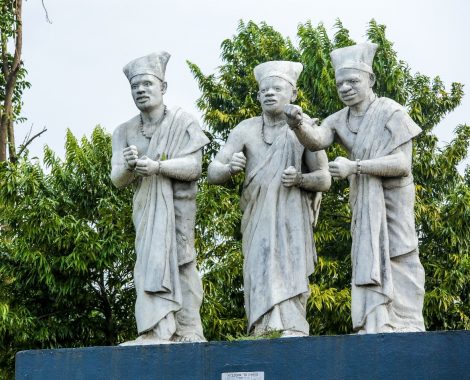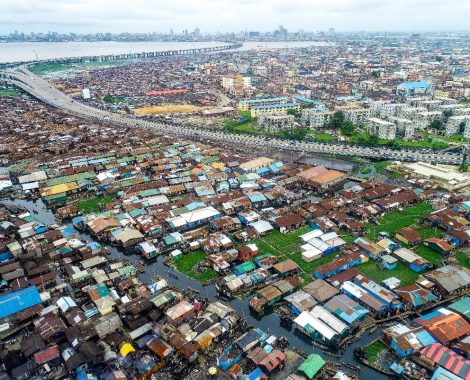Lagos: Ownership and Identities
Intellectual Debates and One Month Photography Exhibition




Credits: Bola Oguntade – Poseidon Imaging
Trailer of the Documentary on Lagos, Nigeria.
Intellectual debates and one month photography exhibition between November 2, 2020 and November 29, 2020 at the Lagos African Cluster Centre (LACC), Africa Multiple, Cluster of Excellence, University of Lagos, Nigeria.
Lagos is considered the melting pot of diverse ethnic groups in both Nigeria and in the West African axis. The city has grown from a small fishing village in the 16th century to a vast metropolis of over 23 million people in present day Nigeria.
Discourse in various fora has revealed that the historical patterns of identity in Lagos have reconfigured citizenship and mobility processes of both indigenes and residents. Debates persist among history scholars and traditional historians of Lagos, as well as observers of contemporary life in the city.
Historically, the controversies surrounding the ownership of Lagos is popular between two different sets of Lagosians: the descendants of Benin kingdom and the Awori people. This has continued to increase the historic and identity tensions among indigenes.
More contemporary tensions in the city are mainly around indigene-settler dynamics, especially in accessing land, political influence and the right to the city[1]. There are persistent tensions around land governance and the urban poor, many of whom are branded ‘foreigners’, and are especially vulnerable to spatial displacements.
The historic and contemporary tensions around identities in Lagos continue to grow, with extensive coverage in the media and other outlets, but limited academic inquiry on a longitudinal and interdisciplinary basis.
The Lagos ACC therefore wishes to convene a series of events to deconstruct the multiple facets of identity tensions in Lagos. An exhibition and series of roundtables will seek to explore the views of different stakeholders and produce a holistic substantiation about Lagos across oral, written and graphic forms of expression. Through this comprehensive approach, we seek to achieve a better understanding of the nature and pattern of historic and ongoing debates, and provide a platform for further discourse on Lagos, her origins and her future.
The exhibition and roundtable discussions will attempt to define
- ‘Who is a Lagosian?
- Where did they come from?
- What are their roles, rights and responsibilities?
- How can these rights be preserved and protected?
For more information, please contact:
Dr. Taibat Lawanson (tlawanson@unilag.edu.ng)
Dr. Abisoye Eleshin (aeleshin@unilag.edu.ng)
African Cluster Centre, Institute of African and Diaspora Studies, University of Lagos
1 The right to the city is defined as the right of all inhabitants present and future to occupy, use, produce just, inclusive and sustainable cities, defined as a common good essential to the quality of life (United Nations (2017) HABITAT III Policy paper 1:The Right to the City and Cities for All )
A Month-long Programme involving Roundtables discussions and exhibitions
Premiere of a Documentary
Title: Lagos Ownership and Identities
Date: 2nd of November, 2020
Time: 11:00am
Venue: Board Room, Faculty of Arts, University of Lagos
Opening Sessions
Roundtable on Historical Discourse on Origins, Identities and Colonial disruptions
Keynote Speaker: Prof. Enocent Msindo (Director, Rhodes, ACC, Rhodes University, South Africa)
Keynote Speech: African Urbanisms: Histories, Trajectories and Challenges
Panel (See Microsite – https://iads.unilag.edu.ng/lacc/?page_id=1617 )
Date: 3rd November, 2020
Time: 11:00am
Venue: Authur Mbanefo Digital Research Centre, Beside Medical Centre, University of Lagos.
Exhibition
Date: 3rd November – 29th November, 2020
Time: 10:00am – 6:00pm Daily
Venue: Gallery, Institute of African and Diaspora Studies, J.P. Clark Building, University of
Lagos.
Artists Roundtable
Date: 19th November, 2020
Time: 11:00am
Venue: Institute of African and Diaspora Studies, J.P. Clark Building, University of Lagos.
Closing Session
Roundtable on Current Tensions: Indigenship, Citizenship and the Right to the City
Speaker: Dr. Taibat Lawanson
Speech: Who Owns the City? Reflections and Emerging Perspectives for Research and
Engagement
Panel: (See microsite)
Time: 2:00pm
Venue: Board Room, Faculty of Arts.
Bibliography
- Collective memory, coloniality and resource ownership questions: the conflict of identities in postcolonial Nigeria
Ikechukwu Umejesi
https://www.tandfonline.com/doi/abs/10.1080/09744053.2014.977595
- Associations on the Basis of Origin in Lagos, Nigeria
Suzanne Comhaire-Sylvain
https://www.jstor.org/stable/3707341
- INDIGENE-SETTLER RELATIONSHIP IN NIGERIA: CASE STUDY OF THE IGBO COMMUNITY IN LAGOS.
Olowojolu, Olakunle
http://eprints.lmu.edu.ng/579/
- Which Lagos, Whose (Hi)story?
Ayọdeji Olukoju
http://wajfas.unilag.edu.ng/index.php/lnr/article/view/836
- Everyday People, Autochthony, and Indigene-Settler Crises in Lagos Commodity Markets
Gbemisola Animasawun
https://www.jstor.org/stable/10.2979/africonfpeacrevi.6.1.02
- The City, Hegemony and Ethno-Spatial Politics: The Press and the Struggle for Lagos in Colonial Nigeria
Wale Adebanwi
https://www.tandfonline.com/doi/abs/10.1080/13537110390444087
- Imag(in)ing Lagos globally
Carol Magee
- Strangers, Indigenes and Child Kidnapping in Late Colonial Lagos.” Lagos Historical Review 13 (July 2013): 1–16.
Osifodunrin, Paul.
https://doi.org/10.4314/lhr.v13i1.1.
- The Politics of Architecture and Urbanism in Postcolonial Lagos, 1960–1986
DANIEL IMMERWAHR
https://www.ocf.berkeley.edu/~immer/Immerwahr%20-%20Architecture%20and%20Urbanism%20in%20Lagos.pdf
- Nigeria: The Egun and their relationship to the Yoruba
https://www.refworld.org/docid/3ae6ad6e7c.html
- Repatriated Africans from Cuba and Brazil in nineteenth century Lagos
https://etd.ohiolink.edu/pg_10?0::NO:10:P10_ACCESSION_NUM:osu1133886688
- Capital Cities in Africa-Chapter 5 Lagos
https://codesria.org/IMG/pdf/Capital_Cities_in_Africa_-_Chapter_5__Lagos.pdf
https://africanpostmark.com/a-lagosian-state-of-mind
https://www.vanguardngr.com/2017/06/history-lagos-aboriginal-tribes/
http://lagosministryofjustice.org/directorates/directorate-for-citizens-rights/
https://www.edoworld.net/History_of_Lagos_State.html
https://www.citiesalliance.org/sites/default/files/Lagos-reform-report-lowres.pdf
https://www.cs.mcgill.ca/~rwest/wikispeedia/wpcd/wp/l/Lagos.htm
https://onelagosfiesta.ng/history-of-lagos/
https://www.vanguardngr.com/2015/04/who-is-a-lagosian/
Obono, Oka. “A Lagos Thing: Rules and Realities in the Nigerian Megacity.” Georgetown Journal of International Affairs 8, no. 2 (Summer/Fall 2007): 31-37.
Lagos: A Cultural and Literary History By Kaye Whiteman
